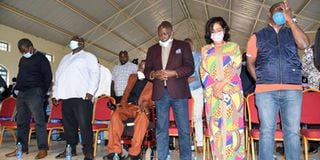Battle lines drawn as Uhuru, Raila allies spurn fresh talks on the BBI

From left: Ruaraka MP TJ Kajwang, Makadara MP George Aladwa, Westlands MP Tim Wanyonyi, nominated MP Maina Kamanda, Nairobi Woman Rep Esther Passaris and Mathare MP Anthony Oluoch during a service at Friends Church Kabete in Nairobi on November 1, 2020.
What you need to know:
- DP Ruto wants fresh talks on the involvement of political parties in the nomination of electoral commissioners.
Prof Hezron Mogambi of the University of Nairobi argues that the BBI report had reached a crucial stage where the “reverse gear seems to have been disengaged.”
It was billed as the panacea for perennial political divisions, but the Building Bridges Initiative (BBI) has taken a path that is likely to leave key politicians and their supporters even more divided.
The process initiated by President Kenyatta and his March 9, 2018 ‘Handshake’ partner Raila Odinga has already alienated Deputy President William Ruto and his allies over their calls to amend the BBI report.
Politicians allied to Mr Kenyatta and Mr Odinga have flatly rejected the idea, saying, there was no window to open the report for further discussions.
DP Ruto wants fresh talks on the involvement of political parties in the nomination of electoral commissioners, the independence of police and the judiciary (citing the Kenya Police Council and the Judiciary Ombudsman, both headed by presidential appointees), as well as making the Senate the Upper House with requisite powers.
“We want a national conversation that will lead to a consensus as the President asked us to do. Do not force the BBI on us otherwise Kenyans will stop reggae,” the DP said yesterday in Karatina during his tour of Nyeri County, where he and his allies de-campaigned the BBI report.
Sharing of revenue
Also rooting for amendments is Amani National Congress (ANC) leader Musalia Mudavadi, who has called for further debate on the judiciary, the economy, rising debt levels and strengthening of the Senate and its place in the sharing of revenue between the two levels of government. But leaders allied to Mr Kenyatta and Mr Odinga have rubbished the calls, saying, the perpetual consultations have to come to an end.
If the two sides don’t come up with a harmonised draft, Kenya could be headed for yet another big political split ahead of a General Election, just as it happened in 2005, two years to the bloody 2007 polls.
The drift between ‘Orange’ and ‘Banana’ camps persisted to the elections rocked by violence, which claimed more than 1,000 lives.
Yesterday, a meeting of members of the National Assembly and the Senate to discuss the BBI report started in Naivasha, but lawmakers allied to the deputy president’s Tangatanga wing of the ruling party said they had been excluded. While National Assembly Majority Leader Amos Kimunya indicated that all members had been invited for the retreat, some of them denied the claim.
Naivasha MP Jayne Kihara, the DP’s close ally, denied having been invited.
“It’s not true [that I was invited]. Ask him what it means,” she told the Nation in a phone interview. The meeting comes even as close allies of Mr Kenyatta and Mr Odinga, including National Assembly Minority Leader John Mbadi, declared the closure of negotiation window.
“I’ve heard the deputy president and his team talk about further consultations about the BBI report. I want to respond that, as the Leader of Minority in the National Assembly, this document is final,” Mr Mbadi said in Ndhiwa Constituency at the weekend.
Vocal Jubilee vice-chairman and President Kenyatta’s confidante David Murathe accused the DP of employing delaying tactics over his calls for “numerous amendments to the BBI proposals”, especially citing the fact that the Head of State said during the report launch last week that the DP had been involved in the process since its inception.
Collecting signatures
“The President said to his face that he (Ruto) was briefed at every stage of the task force and that he participated in the nomination of some of the BBI committee members. What else does he want?,” Mr Murathe posed.
Yesterday, 10 Nairobi MPs, hosted by their Westlands counterpart Tim Wanyonyi at a church service at Francis Church, Kabete, said the BBI battle lines had been drawn. Nominated MP Maina Kamanda announced that, from today, they will start collecting one million signatures.
Prof Hezron Mogambi of the University of Nairobi argues that the BBI report had reached a crucial stage where the “reverse gear seems to have been disengaged.”
“The deputy president neither identified nor involved himself with the BBI process from the start. It’s now at a crucial stage where the reverse gear seems to have been disengaged,” he said.
Prof Macharia Munene of the United States International University (USIU) said “the BBI is not an issue but (the real issue is) the supremacy rivalry between Ruto and Raila.”
Reporting by Justus Ochieng’, Ibrahim Oruko, Patrick Lang’at, Nicholas Komu, Alex Njeru and George Odiwuor. [email protected]





